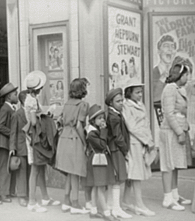
"Children in front of moving picture theater, Easter Sunday matinee, Black Belt, Chicago, Illinois" (Detail)
Credit and Original Image
Search this site:
Campus Resources
Black Film Course Offerings 2004-05
28101. Popular Music and Film (=MUSI 23904):
PQ: Open only to undergraduates. This course explores the relationship between film and popular music through an examination of various film genres, including the musical, rockumentary and biopic. We will consider the historical shift from classical (instrumental) film scores to compilation scores of popular songs, and the use of different musical styles, including jazz, rock, and disco. Throughout, we will explore the ideologies of race, sex and gender embodied in these musical forms, and we'll consider economic industrial motivations. Films include: The Music Man, Cabin in the Sky, The Umbrellas of Cherbourg , Round Midnight , American Graffiti, Saturday Night Fever, The Last Waltz, Truth or Dare. P. Wojcik. Winter 2004 . (H, G/D/S)
ArtH 492. Film Exhibition (=ENGL 689).
In this seminar, we will examine the role of exhibition, the actual presentation of films to audiences, from both theoretical and historical perspectives, exploring the relation of exhibition to theories of spectatorship. Our focus is the effect of theater space and programming (including non-film aspects such as music or vaudeville) on film reception and the nature of film audiences. A range of contrasting models and practices in film exhibition will be investigated (e.g. the nickelodeon, the Picture Palace of the silent feature era, the drive-in theater, African American film theaters, the art house of the post WW II era, the university film club, etc.) The role of architecture, the location of movie theaters within urban environment, the logic of programs, industrial audience research, are all likely topics for research and discussion. Each member of the seminar will develop and present a research topic, so students are encouraged to have some preliminary ideas by the first meeting. Readings will include Baudry, Metz, Tsivian, Gomery, Bruno, Hansen, Carbine, Singer, Allen and others. T. Gunning.
English 320.
The Intimate Public Sphere. Public sphere theory and feminist/queer theory have opened up critical strategies for thinking about the cultural politics of "adaptation" and transgression during the development of subcultures. This course will track two trajectories in the history of women's culture in the United States since the Civil War by tracing questions of capital/race/sexuality and the production of subaltern, middlebrow, and vanguardist critical cultures. The course provides an important arena for studying the production of subjects, of everyday life, of the "ordinary"; the alterity of sex and politics; everyday and mass institutions of intimacy. We will begin by reading Uncle Tom's Cabin and Gone with the Wind, since they each opened rhetorical spaces through which women have adapted specific strategies of legitimation. The course will move through suffrage and into contemporary "women's culture." It will focus on the major novel-to-film melodramas of the 20s-40s: Stella Dallas, Now, Voyager, Show Boat Imitation of Life, but the course will also work through to some major contemporary instances: Beloved, The Bridges of Madison County, The Life, and Loves of a She-Devil, and women's popular therapeutic genres. L. Berlant.
English 481.
Genre and Authorship in Postclassical Cinema. The categories of "genre" and "authorship" have figured prominently in accounts of classical Hollywood cinema, and their relationship has variously been described as conflicting, or complementary. The classical paradigm is commonly held to have been in full force until about 1960 when a series of transformations both within the film industry (break-up of the studio system, diversification of exhibitions sites, foreign imports, erosion of the Production Code) and other media industries (in particular the rise of television), along with larger social, political, and cultural developments began to effect profound changes in the institution of American cinema. In this course we will examine the mutations of concepts of genre and authorship in light of the question of "postclassical" cinema, or cinema in its contemporary, postmodern, and post-Fordist incarnation. Among other things, we will ask to what extent video, cable, and digital technologies have changed the ways films are produced, marketed, and consumed; how they are interpreted and remembered. Screenings will include work by Arthur Penn, Haskell Wexler, Robert Altman, Francis Ford Coppola, Steven Spielberg, Charles Burnett, Spike Lee, Susan Seidelman, Lizzie Borden, Kathryn Bigelow, Ridley Scott, Quentin Tarantino. A background in cinema studies or at least one previous film course required. M. Hansen.